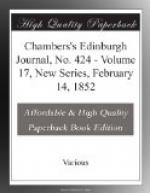But amid these captivating salons and congenial occupations, what had become of the apostle of popular music? He was not asleep; only digesting and preparing a system which should, by its simplicity and clearness, bring scientific music within the reach of the humblest as well as the highest classes of society. At last it was matured, and the working-classes were invited to come and test it—gratuitously of course. A few accepted the invitation; but their success and delight in the new art thus opened up to them, was so great, that the ’two or three’ pioneers soon swelled into an army of 3000 ouvriers! But a band of 3000 workmen in Paris was considered dangerous: it could not be credited that they met merely for social improvement and relaxation; some political design must surely lurk under it: government was alarmed, the police threatened; and it was left to Mainzer’s choice either to remain in Paris without his artisan classes, or to seek elsewhere a field for his popular labours. He decided at once on the latter alternative, and departed for England, amidst the heartfelt regrets of those whom he had attached so strongly to himself, while he inculcated peace, order, and every social virtue. On his revisiting Paris long after, his old pupils serenaded him unmolested; and in 1849, the Institute of France voluntarily placed his name on their list for the membership vacant by the death of Donizetti; yet he would not accept the proposal of a later French government to return and establish his system: he preferred the freedom of action which he enjoyed in Britain.
In London, a period of arduous labour commenced. Mainzer arrived without patronage, without the prestige that his name had earned abroad, and, what was a greater drawback, without any knowledge of English! But, nothing daunted, with his usual energy he set about the task of acquiring the language, which he did in an incredibly short time—commencing, like a child, by naming all familiar objects, and going on, until, without perplexing himself with rules or their exceptions, he had acquired facility enough to lecture in public. His work on Music and Education shows with what force and purity of style he could afterwards write in English. It was the same principle—that of commencing with practice and letting theory follow—which




